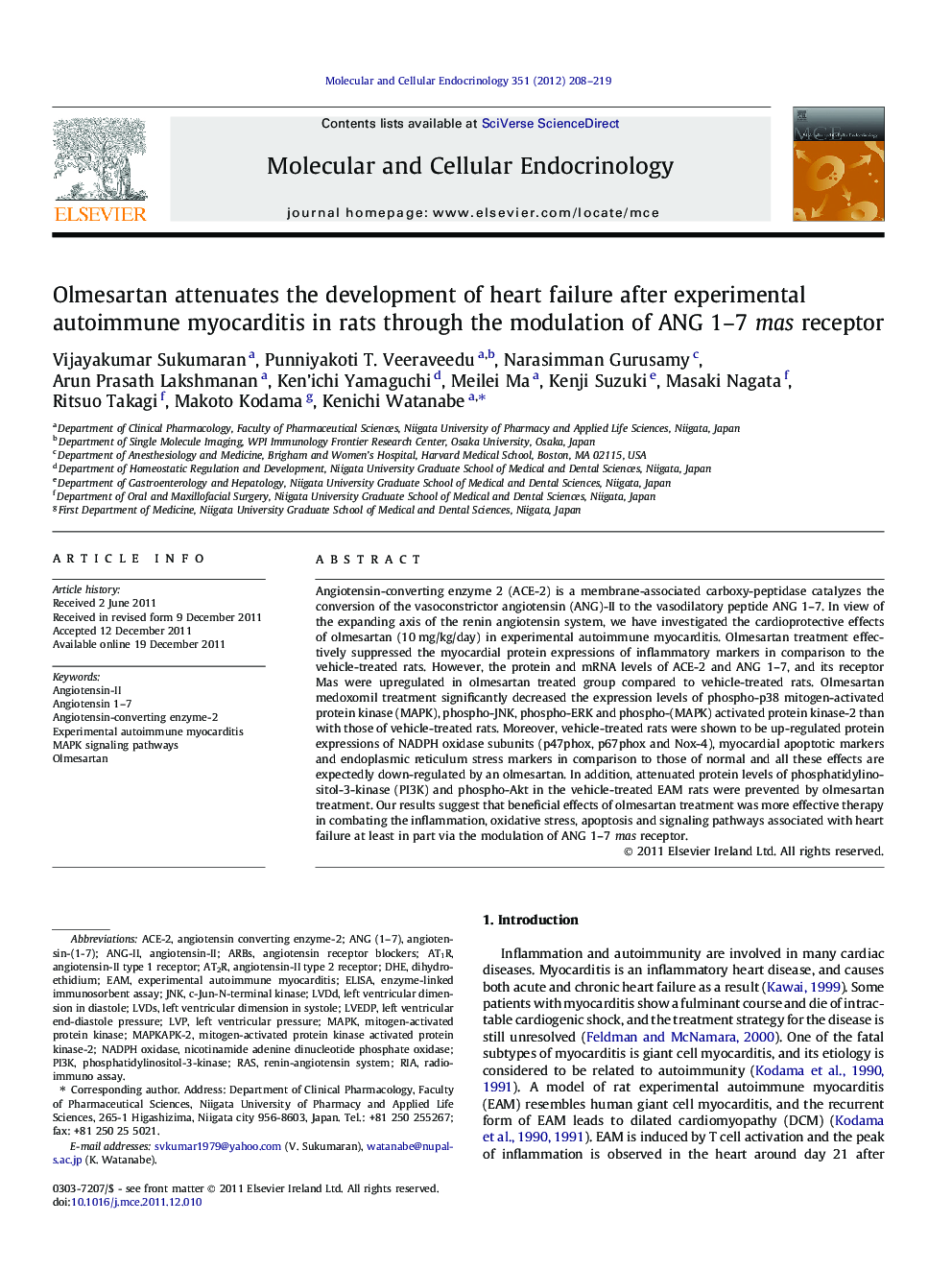| Article ID | Journal | Published Year | Pages | File Type |
|---|---|---|---|---|
| 10956255 | Molecular and Cellular Endocrinology | 2012 | 12 Pages |
Abstract
Angiotensin-converting enzyme 2 (ACE-2) is a membrane-associated carboxy-peptidase catalyzes the conversion of the vasoconstrictor angiotensin (ANG)-II to the vasodilatory peptide ANG 1-7. In view of the expanding axis of the renin angiotensin system, we have investigated the cardioprotective effects of olmesartan (10Â mg/kg/day) in experimental autoimmune myocarditis. Olmesartan treatment effectively suppressed the myocardial protein expressions of inflammatory markers in comparison to the vehicle-treated rats. However, the protein and mRNA levels of ACE-2 and ANG 1-7, and its receptor Mas were upregulated in olmesartan treated group compared to vehicle-treated rats. Olmesartan medoxomil treatment significantly decreased the expression levels of phospho-p38 mitogen-activated protein kinase (MAPK), phospho-JNK, phospho-ERK and phospho-(MAPK) activated protein kinase-2 than with those of vehicle-treated rats. Moreover, vehicle-treated rats were shown to be up-regulated protein expressions of NADPH oxidase subunits (p47phox, p67phox and Nox-4), myocardial apoptotic markers and endoplasmic reticulum stress markers in comparison to those of normal and all these effects are expectedly down-regulated by an olmesartan. In addition, attenuated protein levels of phosphatidylinositol-3-kinase (PI3K) and phospho-Akt in the vehicle-treated EAM rats were prevented by olmesartan treatment. Our results suggest that beneficial effects of olmesartan treatment was more effective therapy in combating the inflammation, oxidative stress, apoptosis and signaling pathways associated with heart failure at least in part via the modulation of ANG 1-7 mas receptor.
Keywords
PI3KLVEDPLVPc-Jun-N-terminal kinaseMAPKAPK-2LVDdAT2RAT1RLVDsRIAMAPK signaling pathwaysACE-2RASangiotensin-II type 1 receptorradio-immuno assayJnkARBsMAPKEAMAngiotensin 1–7angiotensin-IIAngiotensin-(1-7)OlmesartanNADPH oxidaseELISAEnzyme-linked immunosorbent assayAng-IIdihydroethidiumrenin-angiotensin systemphosphatidylinositol-3-kinaseleft ventricular pressureAngiotensin receptor blockersexperimental autoimmune myocarditisnicotinamide adenine dinucleotide phosphate oxidaseDHEmitogen-activated protein kinase
Related Topics
Life Sciences
Biochemistry, Genetics and Molecular Biology
Cell Biology
Authors
Vijayakumar Sukumaran, Punniyakoti T. Veeraveedu, Narasimman Gurusamy, Arun Prasath Lakshmanan, Ken'ichi Yamaguchi, Meilei Ma, Kenji Suzuki, Masaki Nagata, Ritsuo Takagi, Makoto Kodama, Kenichi Watanabe,
